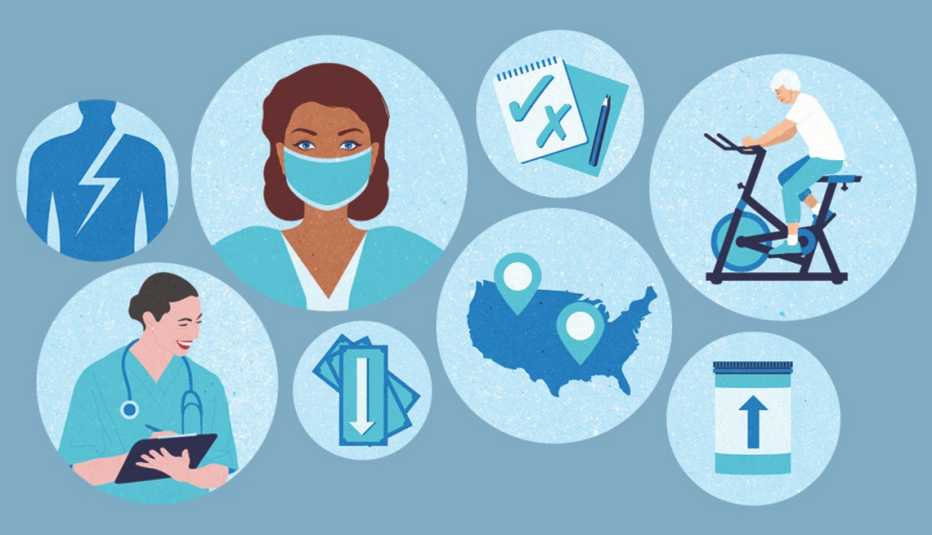3. I’ve been diagnosed with a chronic condition
A serious medical change, such as a diabetes or even a prediabetes diagnosis, should trigger a full review of your Medicare coverage. Consider the care you’ll need.
Join our fight to protect Medicare
AARP is working to keep Medicare strong. Here’s how you can help.
- Sign up to become an AARP activist for the latest news and alerts on issues you care about.
- Find out more about how we’re fighting for you in Congress and across the country.
- See the latest AARP research on Medicare and more.
- AARP is your fierce defender on the issues that matter to people 50-plus. Become a member or renew your membership today.
If you have a Medicare Advantage plan and want a gym membership or disease-specific programs, find a plan that offers them. If you anticipate needing a lot of specialists, make sure they’re in your plan’s network. If you need new medications, make sure your plan covers them.
If you have original Medicare, make sure your Part D policy pays for any new prescriptions, or find one that does. And if you want to work out regularly, some Medigap plans that pair with original Medicare also offer free memberships or discounts. If you anticipate needing lots of specialists, 98 percent of all doctors who aren’t pediatricians accept Medicare, KFF points out.
Making critical changes early can “really affect your pocketbook and save you money,” says Gretchen Jacobson, a vice president with the New York–based Commonwealth Fund foundation.
4. I need surgery and prefer a specific doctor
Original Medicare allows patients to choose any doctor or hospital that accepts Medicare, and since that’s all but 2 percent of physicians who don’t specialize in treating children, chances are good that you’ll be covered.
But if you’re in a Medicare Advantage plan and its surgeons don’t meet your needs, you may need a different Medicare Advantage plan or to switch to original Medicare — if you can be accepted into a Medigap plan. Starting with open enrollment for 2026, the Medicare Plan Finder is listing the providers that participate in some plans.
The people who really need to focus on whether doctors are in network are those who’ve suffered major problems like cancer and heart attack, says Senior Fellow Emeritus Joseph Antos at the American Enterprise Institute, a Washington-based public policy think tank.
“A specialist may be key to their treatment,” he says.
5. I’m super healthy and rarely need a doctor
If you’re in original Medicare, all should be well: As a “pay-for-service” arrangement, not seeing the doctor isn’t costing you anything extra beyond your mandatory Part B and Part D insurance premiums.
If you’re in a Medicare Advantage plan and paying a monthly premium on top of your standard Part B premium, that may be for a plan that offers lots of extras, such as gym memberships. Consider switching to a lower-cost plan without services you don’t plan to use in the coming year.
6. My income has dropped sharply
If you are in original Medicare, your Part B monthly premium is locked in, but your Part D drug plan isn’t. You may be able to find a lower-cost policy that covers the medicines you are on.
If you’re in a Medicare Advantage plan, consider a switch to a plan with no extra payment on top of the mandatory Part B premium.
If your Part B or Part D premiums include an income-related monthly adjustment amount (IRMAA), you can fill out Form SSA-44 to request a review of those additional fees.
And you might qualify for help. Ask your state Medicaid office — links to state offices are on the federal Medicaid website — or State Health Insurance Assistance Program (SHIP) about Medicare Savings Programs. Or call 800-MEDICARE (800-633-4227); the SHIP help line is 877-839-2675.
7. My former employer is changing its retiree benefits
Some companies provide retirees with supplemental insurance, which covers many health costs that original Medicare doesn’t.
If you have changes to your retiree benefit coverage, or for some reason that coverage no longer is offered, contact Medicare’s Coordination of Benefits & Recovery Call Center at 855-798-2627. Someone can tell you whether you fall in the window in which Medigap insurers cannot deny you coverage based on preexisting conditions.
8. My regular doctor is no longer in network for my plan
If you deeply want to stay with a doctor, ask directly whether he or she is moving to a different Medicare Advantage plan, accepting original Medicare patients or dropping out of Medicare completely.
If you decide to make a change, make sure a short-term decision won’t affect your long-term coverage — for example, switching to original Medicare to temporarily stay with one doctor but sacrificing Medigap coverage for the long term. It might be safer to ask your doctor to recommend a colleague in your current plan.
9. I’m in need of serious dental care
Original Medicare doesn’t cover routine dental care costs, but many Medicare Advantage plans do.
If you don’t have your own dental insurance and can’t afford dentistry costs out of pocket, you can buy a stand-alone dental policy. Some Medigap insurers also offer discounts on dental services if you choose from their list of in-network dentists.
If you have Medicare Advantage, you can consider finding a plan that will cover a portion of the costs of your needed work. But Antos warns that figuring out what portion of your dental bills a Medicare Advantage plan will cover is complicated — some plans cover little more than routine cleanings — so it helps to know what services you will use in the coming year.
This story, originally published Oct. 12, 2021, has been updated with information for the 2026 Medicare plan year.






































































Next in Series
What happens if I miss Medicare open enrollment?
In some cases, you still may be able to switch plans